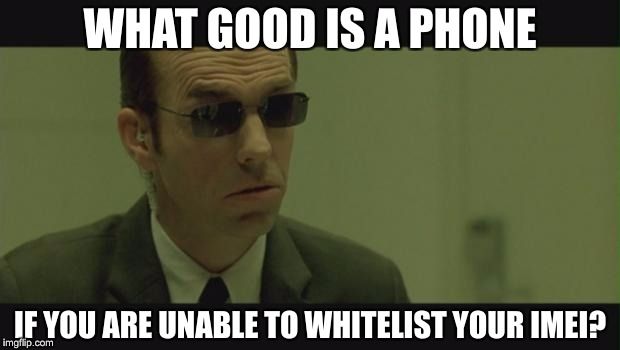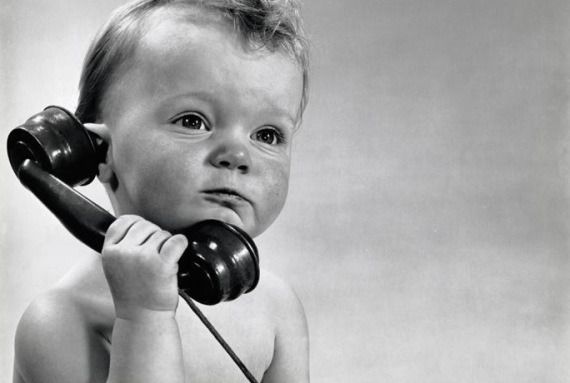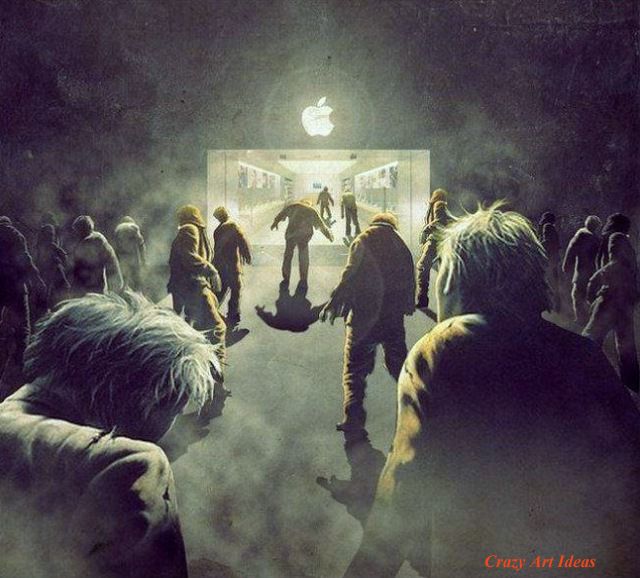It turns out that Chile has joined a small group of countries around the world, that have decided to implement a national IMEI (International Mobile Equipment Identity) whitelist. From some quick investigation, as far as I can tell, the only other countries that boast such a system are Turkey, Azerbaijan, Colombia, and Nepal. Hardly the most venerable group of nations to be joining, in my opinion.
As someone who has been to Chile many times, all I can say is: not happy! Bringing your own mobile device, and purchasing a local SIM card, is the cheapest and the most convenient way to stay connected while travelling, and it's the go-to method for a great many tourists travelling all around the world. It beats international roaming hands-down, and it eliminates the unnecessary cost of purchasing a new local phone all the time. I really hope that the Chilean government reconsiders the need for this law, and I really hope that no more countries join this misguided bandwagon.

Image source: imgflip.
IMEI what?
In case you've never heard of an IMEI, and have no idea what it is, basically it's a unique identification code for all mobile phones worldwide. Historically, there have been no restrictions on the use of mobile handsets, in particular countries or worldwide, according to the device's IMEI code. On the contrary, what's much more common than the network blocking a device, is for the device itself to block access to all networks except one, due to it needing to be unlocked.
A number of countries have implemented IMEI blacklists, mainly in order to render stolen mobile devices useless – these countries include Australia, New Zealand, the UK, and numerous others. In my opinion, a blacklist is a much better solution than a whitelist in this domain, because it only places an administrative burden on problem devices, while all other devices on the network are presumed to be valid and authorised to connect.
Ostensibly, Chile has passed this law primarily to ensure that all mobiles imported and sold locally by retailers are capable of receiving emergency alerts (i.e. for natural disasters, particularly earthquakes and tsunamis), using a special system called SAE (Sistema de Alerta de Emergencias). In actual fact, the system isn't all that special – it's standard Cell Broadcast (CB) messaging, the vast majority of smartphones worldwide already support it, and registering IMEIs is not in any way required for it to function.
For example, the same technology is used for the Wireless Emergency Alerts (WEA) system in the USA, and for the Earthquake Early Warning (EEW) system in Japan, and neither of those countries have an IMEI whitelist in place. Chile uses channel 919 for its SAE broadcasts, which appears to be a standard emergency channel that's already used by The Netherlands and Israel (again, countries without an IMEI whitelist), and possibly also by other countries.
The new law is supposedly also designed to ensure (quoting the original Spanish text):
…que todos los equipos comercializados en el país informen con certeza al usuario si funcionarán o no en las diferentes localidades a lo largo de Chile, según las tecnologías que se comercialicen en cada zona geográfica.
Which translates to English as:
…that all commercially available devices in the country provide a guarantee to the user of whether they will function or not in all of the various regions throughout Chile, according to the technologies that are deployed within each geographical area.
However, that same article suggests that this is a solution to a problem that doesn't currently exist – i.e. that the vast majority of devices already work nationwide, and that Chile's mobile network technology is already sufficiently standardised nationwide. It also suggests that the real reason why this law was introduced, was simply in order to stifle the smaller, independent mobile retailers and service providers with a costly administrative burden, and thus to entrench the monopoly of Chile's big mobile companies (and there are approximately three big players on the scene).
So, it seems that the Chilean government created this law thinking purely of its domestic implications – and even those reasons are unsound, and appear to be mired in vested interests. And, as far as I can see, no thought at all was given to the gross inconvenience that this law was bound to cause, and that it is currently causing, to tourists. The fact that the Movistar Chile IMEI registration online form (which I used) requires that you enter a RUT (a Chilean national ID number, which most tourists including myself lack), exemplifies this utter obliviousness of the authorities and of the big telco companies, regarding visitors to Chile perhaps wanting to use their mobile devices as they see fit.
In summary
Chile is now one of a handful of countries where, as a tourist, despite bringing from home a perfectly good cellular device (i.e. one that's unlocked and that functions with all the relevant protocols and frequencies), the pig-headed bureaucracy of an IMEI whitelist makes the device unusable. So, my advice to anyone who plans to visit Chile and to purchase a local SIM card for your non-Chilean mobile phone: register your phone's IMEI well in advance of your trip, with one of the Chilean companies licensed to "certify" it (the procedure is at least free, for one device per person per year, and can be done online), and thus avoid the inconvenience of your device not working upon arrival in the country.
]]>
Image source: Sticky Comics.
Being now acquainted with my new toy, I believe I can safely say that my reluctance was not (entirely) based on my being a "phone dinosaur", an accusation that some have levelled at me. Apart from the fact that they offer "a tonne of features that I don't need", I'd assert that the current state-of-the-art in smartphones suffers some serious usability, accessibility, and convenience issues. In short: these babies ain't so smart as their purty name suggests. These babies still have a lotta growin' up to do.

Image source: sondasmcschatter.
Touchy
Mobile phones with few buttons are all the rage these days. This is principally thanks to the demi-g-ds at Apple, who deign that we mere mortals should embrace all that is white with chrome bezel.
Apple has been waging war on the button for some time. For decades, the Mac mouse has been a single-button affair, in contrast to the two- or three-button standard PC rodent. Since the dawn of the iEra, a single (wheel-like) button has predominated all iShtuff. (For a bit of fun, watch how this single-button phenomenon reached its unholy zenith with the unveiling of the MacBook Wheel). And, most recently, since Apple's invention of the i(AmTheOneTrue)Phone (of which all other smartphones are but a paltry and pathetic imitation attempted by mere mortals), smartphones have been almost by definition "big on touch-screen, low on touch-button".

Image source: Crazy Art Ideas.
I'm not happy about this. I like buttons. You can feel buttons. There is physical space between each button. Buttons physically move when you press them.
You can't feel the icons on a touch screen. A touch screen is one uninterrupted physical surface. And a touch screen doesn't provide any tactile response when pressed.
There is active ongoing research in this field. Just this year, the world's first fully-functional bumpy touchscreen prototype was showcased, by California-based Tactus. However, so far no commercial smartphones have been developed using this technology. Hopefully, in another few years' time, the situation will be different; but for the current state-of-the-art smartphones, the lack of tactile feedback in the touch screens is a serious usability issue.
Related to this, is the touch-screen keyboard that current-generation smartphones provide. Seriously, it's a shocker. I wouldn't say I have particularly fat fingers, nor would I call myself a luddite (am I not a web developer?). Nevertheless, touch-screen keyboards frustrate the hell out of me. And, as I understand it, I'm not alone in my anguish. I'm far too often hitting a letter adjacent to the one I poked. Apart from the lack of extruding keys / tactile feedback, each letter is also unmanageably small. It takes me 20 minutes to write an e-mail on my smartphone, that I can write in about 4 minutes on my laptop.
Touch screens have other issues, too. Manufacturers are struggling to get touch sensitivity level spot-on: from my personal experience, my Galaxy S3 is far too hyper-sensitive, even the lightest brush of a finger sets it off; whereas my fiancée's iPhone 4 is somewhat under-sensitive, it almost never responds to my touch until I start poking it hard (although maybe it just senses my anti-Apple vibes and says STFU). The fragility of touch screens is also of serious concern – as a friend of mine recently joked: "these new phones are delicate little princesses". Fortunately, I haven't had any shattered or broken touch-screen incidents as yet (only a small superficial scratch so far); but I've heard plenty of stories.
Before my recent switch to Samsung, I was a Nokia boy for almost 10 years – about half that time (the recent half) with a 6300; and the other half (the really good ol' days) with a 3100. Both of those phones were "bricks", as flip-phones never attracted me. Both of them were treated like cr@p and endured everything (especially the ol' 3100, which was a wonderfully tough little bugger). Both had a regular keypad (the 3100's keypad boasted particularly rubbery, well-spaced buttons), with which I could write text messages quickly and proficiently. And both sported more button real-estate than screen real-estate. All good qualities that are naught to be found in the current crop of touch-monsters.
Great, but can you make calls with it?
After the general touch-screen issues, this would have to be my next biggest criticism of smartphones. Big on smart, low on phone.

Image source: Ars Technica.
Smartphones let you check your email, update your Facebook status, post your phone-camera-taken photos on Instagram, listen to music, watch movies, read books, find your nearest wood-fired pizza joint that's open on Mondays, and much more. They also, apparently, let you make and receive phone calls.
It's not particularly hard to make calls with a smartphone. But, then again, it's not as easy as it was with "dumb phones", nor is it as easy as it should be. On both of the smartphones that I'm now most familiar with (Galaxy S3 and iPhone 4), calling a contact requires more than the minimum two clicks ("open contacts", and "press call"). On the S3, this can be done with a click and a "swipe right", which (although I've now gotten used to it) felt really unintuitive to begin with. Plus, there's no physical "call" button, only a touch-screen "call" icon (making it too easy to accidentally message / email / Facebook someone when you meant to call them, and vice-versa).
Receiving calls is more problematic, and caused me significant frustration to begin with. Numerous times, I've rejected a call when I meant to answer it (by either touching the wrong icon, or by the screen getting brushed as I extract the phone from my pocket). And really, Samsung, what crazy-a$$ Gangman-style substances were you guys high on, when you decided that "hold and swipe in one direction to answer, hold and swipe in the other direction to reject" was somehow a good idea? The phone is ringing, I have about five seconds, so please don't make me think!
In my opinion, there REALLY should be a physical "answer / call" button on all phones, period. And, on a related note, rejecting calls and hanging up (which are tasks just as critical as are calling / answering) are difficulty-fraught too; and there also REALLY should be a physical "hang up" button on all phones, period. I know that various smartphones have had, and continue to have, these two physical buttons; however, bafflingly, neither the iPhone nor the Galaxy include them. And once again, Samsung, one must wonder how many purple unicorns were galloping over the cubicles, when you decided that "let's turn off the screen when you want to hang up, and oh, if by sheer providence the screen is on when you want to hang up, the hang-up button could be hidden in the slid-up notification bar" was what actual carbon-based human lifeforms wanted in a phone?
Hot and shagged out
Two other critical problems that I've noticed with both the Galaxy and the iPhone (the two smartphones that are currently considered the crème de la crème of the market, I should emphasise).
Firstly, they both start getting quite hot, after just a few minutes of any intense activity (making a call, going online, playing games, etc). Now, I understand that smartphones are full-fledged albeit pocked-sized computers (for example, the Galaxy S3 has a quad-core processor and 1-2GB of RAM). However, regular computers tend to sit on tables or floors. Holding a hot device in your hands, or keeping one in your pocket, is actually very uncomfortable. Not to mention a safety hazard.
Secondly, there's the battery-life problem. Smartphones may let you do everything under the sun, but they don't let you do it all day without a recharge. It seems pretty clear to me that while smartphones are a massive advancement compared to traditional mobiles, the battery technology hasn't advanced anywhere near on par. As many others have reported, even with relatively light use, you're lucky to last a full day without needing to plug your baby in for some intravenous AC TLC.
In summary
I've had a good ol' rant, about the main annoyances I've encountered during my recent initiation into the world of smartphones. I've focused mainly on the technical issues that have been bugging me. Various online commentaries have discussed other aspects of smartphones: for example, the oft-unreasonable costs of owning one; and the social and psychological concerns, such as aggression / meanness, impatience / chronic boredom, and endemic antisocial behaviour (that last article also mentions another concern that I've written about before, how GPS is eroding navigational ability). While in general I agree with these commentaries, personally I don't feel they're such critical issues – or, to be more specific, I guess I feel that these issues already existed and already did their damage in the "traditional mobile phone" era, and that smartphones haven't worsened things noticeably. So, I won't be discussing those themes in this article.
Anyway, despite my scathing criticism, the fact is that I'm actually very impressed with all the cool things that smartphones can do; and yes, although I was dragged kicking and screaming, I have also succumbed and joined the "dark side" myself, and I must admit that I've already made quite thorough use of many of my smartphone's features. Also, it must be remembered that – although many people already claim that they "can hardly remember what life was like before smartphones" – this is a technology that's still in its infancy, and it's only fair and reasonable that there are still numerous (technical and other) kinks yet to be ironed out.
]]>